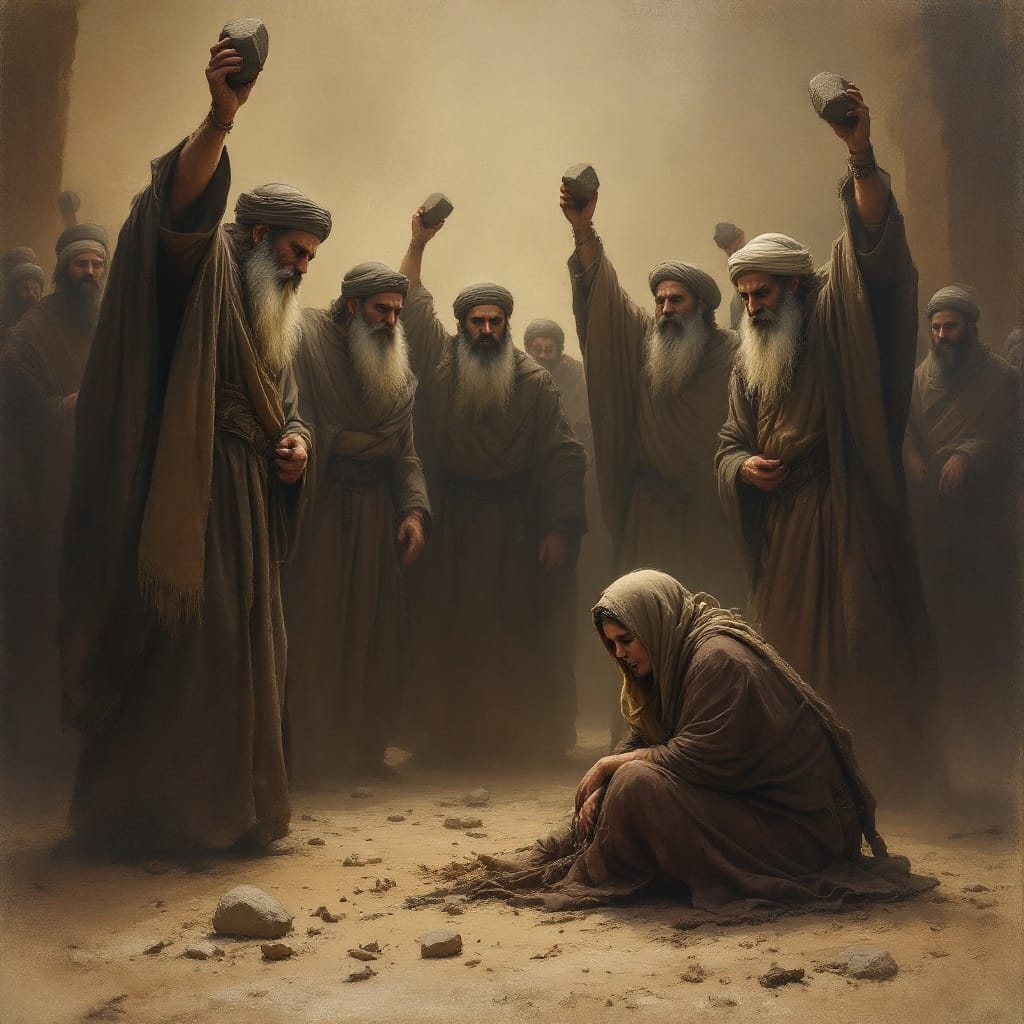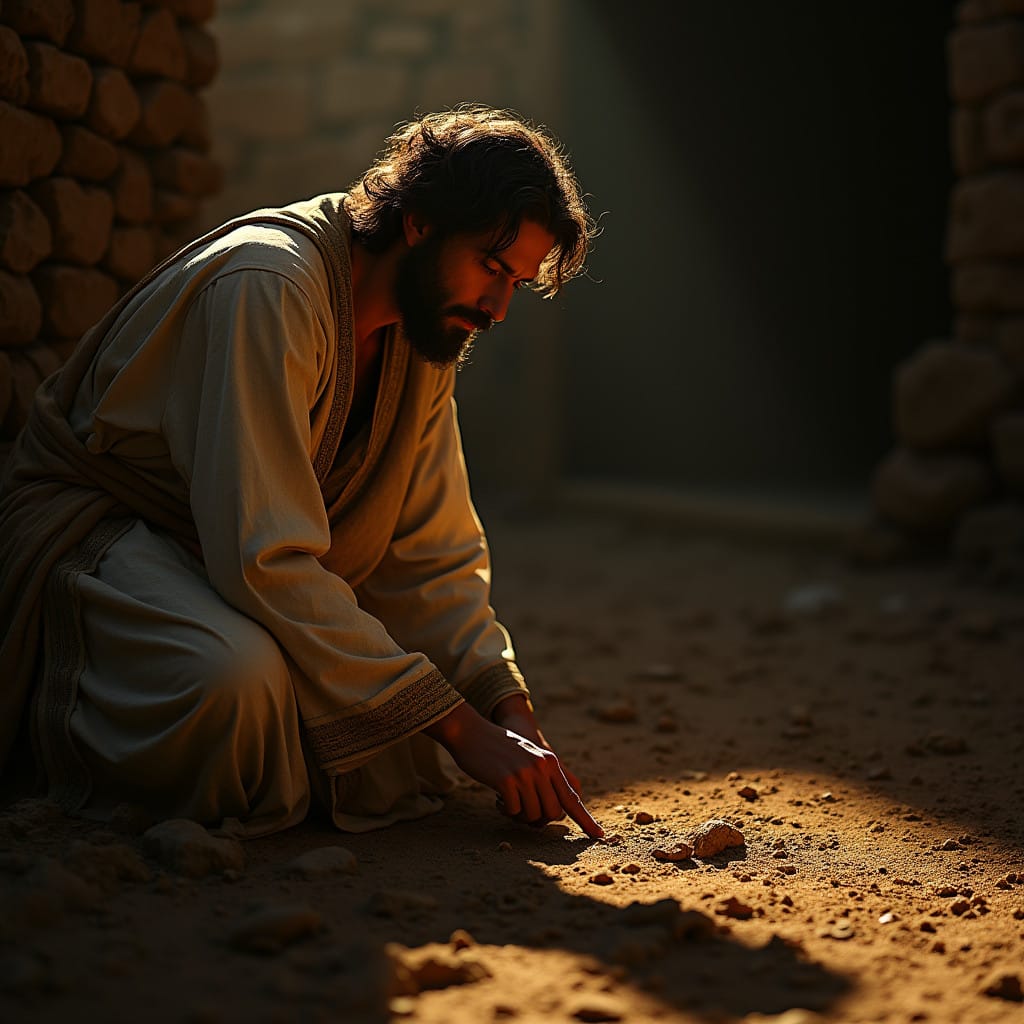| site search by freefind |
- Home
- Social Theory
- Did Jesus Condemn Adultery
[If you purchase anything on this site, I may make a commission. Disclosure Policy]
Did Jesus Condemn Adultery?
Quick Answer: In John 8:1-11, the story of the woman caught in adultery reveals a strategic attempt by the scribes and Pharisees to trap Jesus. They present the woman to Him, declaring the Law of Moses demands her stoning, thereby putting Jesus in a no-win situation: uphold the law and risk public outrage, or oppose it and face charges of blasphemy. Jesus responds by challenging their motives. By emphasizing that those without sin should cast the first stone, He exposes their hypocrisy. When no accusers remain, the legal case dissolves due to the lack of witnesses. Jesus condemns adultery but offers the woman mercy. The narrative underscores notions of justice, mercy, and the correct interpretation of divine law, emphasizing that God's Law persists while illustrating Jesus's role as the Saviour who brings grace alongside truth. Read the full article below or watch the video.
Before we begin, we should note that this story of the woman taken in adultery was possibly not in the autographs [original manuscripts]. John 8:1-11 is not found in some of our most ancient manuscripts, so it is possible that it was not part of the Gospel of John as John wrote it. Nevertheless, assuming it is part of Divine Scripture, let us proceed...
Sitemap -
Newsletter -
Statement Of Faith -
Donate
Follow us on social media for daily Scripture comments and more at MeWe, Facebook or YouTube.
To understand what is happening, we need to look at this controversial story one step at a time.
And early in the morning he came again into the temple, and all the people came unto him; and he sat down, and taught them. And the scribes and Pharisees brought unto him a woman taken in adultery; and when they had set her in the midst,
They say unto him, "Master, this woman was taken in adultery, in the very act. Now Moses in the law commanded us, that such should be stoned: but what sayest thou?"
This they said, tempting him, that they might have to accuse him. But Jesus stooped down, and with his finger wrote on the ground, as though he heard them not. John 8:2-6, KJV

Jesus
was teaching in the temple. The scribes and Pharisees did not like His influence over the people, and this was one of the many plots they devised to trick Him. So, even from the very beginning, this was not about the woman. She was, in a sense, an innocent tool in a vicious plot to destroy Jesus' ministry.
The scribes and Pharisees claimed to have taken this woman in the very act of adultery. This was to remove all doubt of guilt. They did not want to allow Jesus to escape their trap by letting Him say, "Can you prove it?" No, they made sure there was no doubt of guilt.
The Test
Notice the flattery - "Master." They did not consider Jesus as a Master. They were in no way His disciples. From their very first word, they were trying to manipulate Jesus. They were trying to put Him off guard by stroking His ego with a term of respect and attempting to make Him think they really did want His judgment on this "important" case.
Here is the test. "Moses commanded…what do you say?" Will you support the Law of God given through Moses or denounce it? In their limited thinking, they thought they had handed Him an unanswerable question. Either choice would destroy Him. If He said, "Stone her," then the people would recognize the injustice of killing one woman for adultery in a city full of immorality. Others were committing adultery every day with no legal consequences. Would it be justice to revive an ancient law in just one case? On the other hand, it was the law of God through Moses. If Jesus said, "Don't stone her," the people would have picked up stones and stoned Him to death for blasphemy.
Of course, Satan had a deeper motive. His primary purpose was to get Jesus to sin. It didn't matter how small; any sin would do. For Jesus to be the Lamb of God for the sins of the world, for Him to pay the price for our sins, He had to be perfect. If Jesus permitted or condoned an injustice, He would sin. If He in any way broke the law of God through Moses [which was, in fact, His own Law since the Son is the Word of God] or condoned others breaking it, He would sin. It was not just the ministry of Jesus that was on the line; the destiny of every human being hung in the balance. As far as the scribes, Pharisees and Satan knew, it was a no-win situation.
Since this was a trap, the scribes and Pharisees were, from the very beginning, twisting the law and being dishonest with the truth.
If a man commits adultery with another man’s wife—with the wife of his neighbor—both the adulterer and the adulteress must be put to death. Lev. 20:10
To be caught in the act of adultery, two people must be present—simple logic. You can't commit adultery by yourself. Since this woman was caught in the act, where was the man? The law is clear; BOTH deserve death. The satanic heathen cultures around the world and in history often make adultery a female offence and not a male offence. God does not play favourites. The scribes and Pharisees had no interest in justice or God's Law. They were corrupt all the way through.
The Response Of Jesus
To Adultery
How did Jesus react? He just ignored them.
So when they continued asking him, he lifted up himself, and said unto them, 'He that is without sin among you, let him first cast a stone at her."
And again he stooped down, and wrote on the ground. And they which heard it, being convicted by their own conscience, went out one by one, beginning at the eldest, even unto the last: and Jesus was left alone, and the woman standing in the midst. John 8:7-9, NIV
If you want to upset a self-righteous, prideful person, ignore them! Jesus was allowing them to retreat before He exposed their hypocrisy. But they were not smart enough to take the opportunity. They kept pressing Him until He answered.
Now, here is an essential part. This is where the Antinomians misread Scripture. They jump up and say, "See, Jesus said not to stone her. God's Law no longer applies." Of course, if they are correct, as stated above, then Jesus could not have been our Saviour, and we are all [including Jesus] destined to Hell for eternity.
Look at what Jesus actually said. Basically, He said, "The Law of God is right. Stone her." He upheld the Law of God as being correct and just - not only in its declaration of crime but also in the crime's punishment. He said precisely the opposite of what every Antinomian wanted Him to say or "thinks" He said!
This Sin
So why wasn't the woman executed? Jesus, as a Champion of the Law, was not about to allow the scribes and Pharisees to corrupt it and bring injustice upon the woman. Jesus required the entire law be kept.
The hands of the witnesses shall be first upon him to put him to death, and afterward the hands of all the people. So thou shalt put the evil away from among you. Deut. 17:7, KJV
Jesus said, "He that is without sin…" Again the Antinomians are happy because they say, "See, nobody is perfect, so we can't judge one another." Keep in mind that this is presented to Jesus as a criminal case. If the Antinomians are correct, then it means total anarchy. No one could press charges against a murderer, a rapist, a robber, etc., because no one is perfect. God is not the God of confusion, but order - so it should be evident that that is a misinterpretation of the words of Jesus.
So what did Jesus mean by what He said? Remember, this is a criminal case. The witnesses in a capital criminal case had to lead in the execution of the criminal [upon conviction, of course] to show their disapproval of this violation of God's Law and attack on the life of the community. To do that, the witnesses had to be innocent of the crime they were witnessing against. For example, a murderer could not witness against another murderer; a robber could not witness against a thief. It would be the height of hypocrisy to condemn someone for the same kind of crime you have committed. God hates hypocrisy. Therefore, what Jesus meant [and the Greek words give this implication], "He that is without THIS sin…"
That means every single one of those scribes and Pharisees was guilty of adultery. They were just as guilty of the same sin as the woman they condemned. They deserved the same penalty! And now, they knew that Jesus knew their guilt. They had no choice but to retreat.
Religious Forgiveness
So what now? Jesus is left with a woman guilty of adultery, deserving death.
Jesus straightened up and asked her, “Woman, where are they? Has no one condemned you?”
“No one, sir,” she said.
“Then neither do I condemn you,” Jesus declared. “Go now and leave your life of sin.” John 8:10-11, NIV
Again, Jesus returned to the Law. Like David, Jesus loved the Law.
At the mouth of two witnesses, or three witnesses, shall he that is worthy of death be put to death; but at the mouth of one witness he shall not be put to death. Deut. 17:6
Jesus looked around and did not see any witnesses. The woman looked around and did not see any witnesses either. Without witnesses, there cannot be a criminal case; without a criminal case, there cannot be a conviction, and without a conviction, there cannot be a punishment. No witnesses, case dismissed for lack of evidence.
From a legal point of view, there was no criminal case. But that did not mean the woman was innocent, only that there wasn't enough evidence to convict. Both Jesus and the woman [and all the bystanders] knew she was guilty. What Jesus then did was extend the forgiveness and mercy of God to her. God was not going to press charges in the courts of heaven. She was forgiven, and her life was wiped clean of any wrongdoing as far as God was concerned. Jesus then instructed her not to fall into the trap of adultery again.
Champion Of The Law

We can all identify with this woman. We all stand guilty before God of more sins and crimes than we know. We deserve punishment and death. But if we will come to Jesus and accept Him as Lord and Saviour, our sins and crimes, as far as God is concerned, are forgiven and forgotten. That does not mean, however, that if we have committed sins that are crimes against God's civil law, we escape punishment. We may very well have to face the consequences of any criminal actions we have committed on this earth.
Jesus championed God's Law through Moses at every turn in this story. It is only a serious misreading of this and other Scriptures to say that Jesus did away with God's Law. [See the Master Life e-mail course.]
The logical question then arises, since God's Law, including crime and punishment, lasts until the Second Coming, should we be executing people who commit adultery and other Biblically capital crimes today? Wouldn't we seriously depopulate the earth if we did that? [Never mind that abortionists are busy depopulating the earth through mass murder…but that's a different subject.]
True, if all the Biblical capital crimes were fully enforced today, the nations would be vastly depopulated. [Of course, humanists do that through abortion against people who have committed no crime.] That really means that a large portion of the population is in direct, deliberate rebellion against the Lord Jesus Christ. This is, of course, treason. In any case, for any law to be effectively applied, it must have the support of the majority of the citizens. Take this family/society destroying act of adultery, for example. Where the majority of people engage in, approve of, or even ignore adultery, no enforcement of any laws against adultery is possible. Where the majority of people in society stand against God's Law, we move from individual judgment on earth [although we all will stand individually before God at the Final Judgment] to a national judgment. God will bring His judgments against the nation for their violations or approval of violations of His Law. The only thing that will avoid this is if there is a large-scale national repentance and turning to God.
Remember that in a society that honours God's Law, these types of crimes would be very rare. Unlike today, very few people would be affected. Society would be healthy.
One more critical point:
Moreover ye shall take no satisfaction for the life of a murderer, which is guilty of death: but he shall be surely put to death. Num. 35:31, NIV
The ONLY time we are told that a criminal must "surely be put to death" is in the case of murder. This leads some Bible scholars to believe that in other capital crimes [such as adultery], execution was the maximum allowable penalty but not the required penalty in every case.
Did Jesus Condemn Adultery?
Frequently Asked Questions
Question: Why Is The Story Of The Woman Caught In Adultery Absent From Some Ancient Manuscripts?
Question: Why Is The Story Of The Woman Caught In Adultery Absent From Some Ancient Manuscripts?
Answer: The most ancient manuscripts we have do not include this story. Likely, it was not part of the original manuscript but an ancient oral tradition added later. If this is the case, then it cannot claim Divine inspiration. On the other hand, nothing in the story contradicts what we know about Jesus or the times in which He lived. The incident most likely happened as recorded but was omitted by the Gospel writers. Textual Criticism's skill and art is to ensure we have the most accurate manuscripts possible since none of the original autographs [manuscripts] exist today.
Question: What Significance Did Jesus' Act Of Writing On The Ground Serve In This Confrontation?
Question: What Significance Did Jesus' Act Of Writing On The Ground Serve In This Confrontation?
Answer: We are not told what Jesus wrote on the ground, but whatever it was, it showed His opponents that He knew of their adulteries. Perhaps it was the names of their girlfriends? This is the only time that Jesus is recorded as having written something.
Question: Why didn't Jesus address the absence of the male adulterer?
Question: Why didn't Jesus address the absence of the male adulterer?
Answer: This was never about the act of adultery. Its purpose was to present Jesus with a non-win situation to destroy Him. Jesus dealt with the main issue. If this had proceeded to a formal trial, the identity and guilt of the man would have been relevant.
For more information about Glenn Davis, see our About Glenn page or visit Glenn Davis Books.
Follow us on social media for daily Scripture comments and more at MeWe, Facebook or YouTube.
Sitemap -
Newsletter -
Statement Of Faith -
Donate
Sign up for our free monthly newsletter or take one of our free Bible Study courses.
Please note: We no longer have the commenting feature [maybe again in the future]. Joshua Institute students who have questions or comments on their courses can use the contact button and mention the course name and lesson number in the email. Thank you. Glenn

Privacy - Disclosure

















![At Mount Sinai, did Israel reject relationship [Grant Covenant] and demand a Law Covenant?](/images/IsraelMountSinai-2.png)








